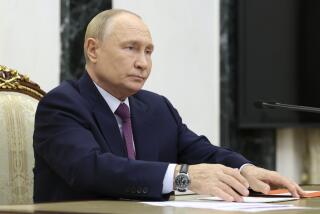Arms Proposal Praised by Soviet Defense Chief : But Plan to Reduce Missiles Hasn’t Ended Threat of Nuclear War, Yazov Says
- Share via
MOSCOW — Soviet Defense Minister Dmitri T. Yazov said Saturday that unnamed “reactionary imperialist circles” are still seeking military superiority and that “the threat of nuclear war has not been averted.”
Speaking at the Red Square parade on the 70th anniversary of the Bolshevik Revolution, however, the four-star general welcomed an agreement on elimination of intermediate nuclear weapons that is expected to be signed at the upcoming superpower summit in Washington.
Yazov also spoke favorably of the proposed 50% reduction in strategic weapons and continued compliance with the 1972 Anti-Ballistic Missile Treaty that will be discussed in December by Soviet leader Mikhail S. Gorbachev and President Reagan.
These are “favorable trends in international relations,” he said during the traditionally hard-line military commander’s speech from the top of Lenin’s Tomb.
As is customary, he gave assurances that the Soviet Union is taking all necessary measures to keep its armed forces in such a state of readiness that no aggressor would dare attack.
Yazov, who has held the defense minister’s post for only six months, is an alternate member of the Politburo. He was promoted when his predecessor, Sergei L. Sokolov, was fired after teen-age West German pilot Mathias Rust flew a small plane from Helsinki, Finland, to Moscow and landed at Red Square last May.
“Despite favorable trends in international relations, the world situation remains complicated,” he said. “The threat of nuclear war has not been averted. Reactionary imperialist circles, ignoring the lessons of history, are continuing to strive for military superiority.” The term “reactionary imperialist circles” in the Kremlin’s lexicon usually refers to the United States and its allies in the North Atlantic Treaty Organization.
Western diplomats, however, said the reference has become standard for the annual military parade on Nov. 7, and they felt the overall tone of Yazov’s remarks was in line with Gorbachev’s “new thinking” on nuclear disarmament.
Yazov implied that major changes are taking place in the Soviet armed forces to enhance “vigilance and combat readiness.” He said that perestroika --the same word used by Gorbachev to describe a revolutionary change in economic and social life--is under way in the military services as well.
The parade showed some of the Soviet military muscle, but Western analysts said only one piece of equipment--an amphibious troop carrier--was shown for the first time on Red Square.
Only shorter-range missiles with a range of less than 300 miles--and thus not covered by the anticipated agreement on elimination of intermediate weapons--were displayed.
In a commemoration of the early defenders of the revolution, however, the parade included a contingent dressed as “Red Guards,” representing the black-jacketed industrial workers who helped to seize power.
There was a trace of snow, subfreezing temperatures and a cold wind blowing across the square as the military show started. Gorbachev and his Politburo colleagues wore fur hats and woolen mufflers to ward off the chill.
Cavalrymen on horseback and several tachankas, or carts equipped with machine guns and pulled by four horses, marched past the reviewing stand.
Soldiers with rifles and bayonets in greatcoats worn during the civil war, along with others dressed in World War II uniforms, joined the parade.
Gorbachev, occasionally waving to the participants, was joined on the tomb by Cuban President Fidel Castro and four East European Communist leaders--Wojciech Jaruzelski of Poland, Erich Honecker of East Germany, Todor Zhivkov of Bulgaria and Nicolae Ceausescu of Romania.
In addition, Moscow Communist Party leader Boris N. Yeltsin, who reportedly offered to resign recently because of frustration over the slow pace of national reform, was standing close to Gorbachev.
Meanwhile, Gorbachev’s wife, Raisa, wearing a gray fur coat with a white fur hat, chatted with reporters in the spectator section. She said she will be going to Washington for the December summit “if it takes place,” but the remark seemed to indicate caution about being outspoken rather than any doubt that the summit will be held.
Her daughter, Irina, said she and her daughter, Oksana, will remain at home during the summit.
More to Read
Sign up for Essential California
The most important California stories and recommendations in your inbox every morning.
You may occasionally receive promotional content from the Los Angeles Times.













